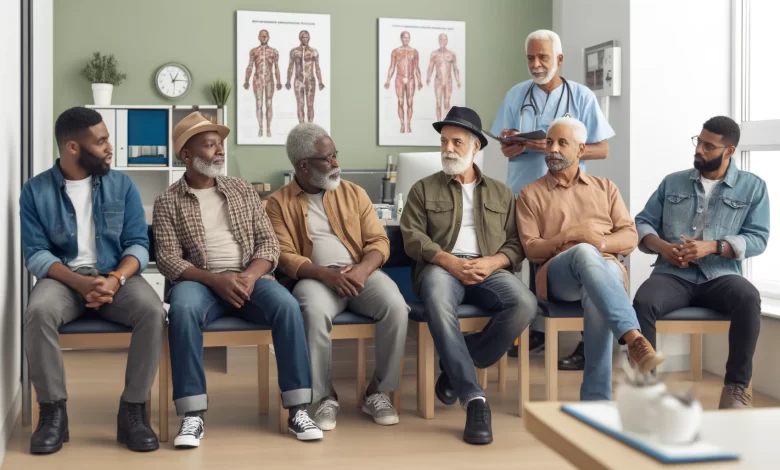Bridging the Gap: Addressing Health Disparities in African American Men

Health disparities among African American men are a critical issue in the United States, reflecting broader systemic inequalities that impact their health outcomes and overall well-being. These disparities are influenced by a combination of factors, including limited access to quality healthcare, socioeconomic challenges, and the pervasive effects of discrimination. This article delves into the complexities of these disparities, highlights relevant statistics and research, and explores strategies to improve healthcare equity through community-based interventions.
The Scope of Health Disparities
- Access to Quality Healthcare
- Statistics: According to the U.S. Department of Health and Human Services, African American men are less likely to have health insurance compared to their white counterparts. In 2019, 11.4% of African Americans were uninsured, compared to 7.8% of whites.
- Impact: Lack of insurance often leads to fewer doctor visits, delayed treatments, and limited access to preventive services, contributing to poorer health outcomes.
- Socioeconomic Factors
- Income and Employment: African American men often face higher unemployment rates and lower median incomes. In 2020, the unemployment rate for African Americans was 10.3%, compared to 7.5% for whites.
- Education: Lower educational attainment among African American men correlates with reduced access to higher-paying jobs and health benefits. According to the National Center for Education Statistics, only 37% of African American men aged 25 to 29 had completed an associate’s degree or higher in 2019.
- Discrimination and Health Outcomes
- Chronic Stress: Continuous exposure to discrimination can lead to chronic stress, which negatively impacts both mental and physical health. Research published in the American Journal of Public Health found that perceived racial discrimination was associated with higher levels of stress and subsequent health issues.
- Healthcare System Bias: Studies have shown that African American men often receive lower quality care due to implicit biases within the healthcare system. For example, they are less likely to receive pain management treatment compared to white patients, as noted in a 2016 study published in the Proceedings of the National Academy of Sciences.
Specific Health Disparities
- Cardiovascular Diseases
- African American men are disproportionately affected by cardiovascular diseases. According to the American Heart Association, they are 30% more likely to die from heart disease than non-Hispanic white men.
- Hypertension is particularly prevalent, with the Centers for Disease Control and Prevention (CDC) reporting that 40.8% of African American men have high blood pressure, compared to 30.5% of white men.
- Diabetes
- The prevalence of diabetes among African American men is significantly higher, with the CDC indicating that 13.4% of African Americans have diabetes compared to 7.4% of non-Hispanic whites.
- Complications from diabetes, such as kidney disease and lower limb amputations, are also more common in African American men.
- Cancer
- African American men have the highest mortality rate for cancer compared to other racial groups. The American Cancer Society reports that African American men are twice as likely to die from prostate cancer as white men.
- The disparity in cancer outcomes is attributed to a combination of factors, including later stage at diagnosis, access to care, and socioeconomic status.
Strategies for Improving Healthcare Equity
- Enhancing Access to Quality Healthcare
- Policy Changes: Advocating for policies that expand health insurance coverage, such as Medicaid expansion, can significantly improve access to healthcare for African American men.
- Community Health Centers: Increasing funding and support for community health centers in underserved areas can provide crucial services, including preventive care and chronic disease management.
- Addressing Socioeconomic Barriers
- Education and Job Training: Implementing programs that provide educational and vocational training can help African American men secure better-paying jobs with health benefits.
- Economic Support: Initiatives that address economic disparities, such as affordable housing and food security programs, can indirectly improve health outcomes by reducing stress and enhancing overall well-being.
- Combating Discrimination in Healthcare
- Implicit Bias Training: Providing healthcare professionals with training on implicit bias can help improve patient-provider interactions and ensure more equitable treatment.
- Diverse Workforce: Increasing the diversity of the healthcare workforce can improve cultural competence and trust between providers and African American patients.
- Community-Based Interventions
- Health Education: Community organizations can play a pivotal role in educating African American men about preventive health measures, chronic disease management, and the importance of regular screenings.
- Support Groups: Creating support groups for African American men can provide emotional support, reduce feelings of isolation, and promote mental health.
- Faith-Based Initiatives: Churches and other faith-based organizations can offer health programs, screenings, and wellness events that resonate with the community’s values and trust.
Addressing health disparities among African American men requires a multifaceted approach that tackles systemic issues and promotes equitable access to healthcare. By implementing targeted strategies and community-based interventions, we can work towards a future where all individuals have the opportunity to achieve optimal health and well-being. The journey to healthcare equity is ongoing, but with concerted efforts, positive change is within reach.





